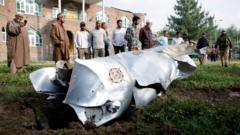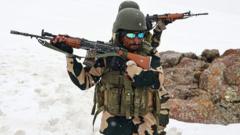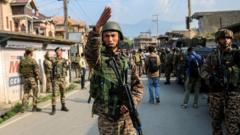Tensions have escalated dramatically between India and Pakistan as both nations accuse each other of engaging in aggressive military operations. In recent statements, India claimed it successfully defended against multiple drone and missile strikes aimed at its military bases in Jammu and Udhampur, as well as Pathankot. Pakistan, on the other hand, has firmly denied these allegations, with Defence Minister Khawaja Asif asserting, “We deny it, we have not mounted anything so far.” The claims surfaced as incidents of shelling and explosions were reported in Jammu, leading to fears of a broader conflict.
**Escalating Tensions: India and Pakistan Exchange Drone Strike Accusations**

**Escalating Tensions: India and Pakistan Exchange Drone Strike Accusations**
In a volatile standoff, India and Pakistan have traded serious allegations over drone strikes, risking further escalation in their long-standing conflict.
India announced it took preemptive action against supposed Pakistani air defense systems in response to an earlier purported attempt to target Indian military sites. As the conflict spirals, international calls for de-escalation have intensified, urging both countries to resolve their disputes peacefully. Causalities have begun to rise, with each side reporting deaths and injuries attributed to the other's military actions.
The recent escalation is seen as the most severe confrontation between the two nuclear-armed nations in over twenty years, with historical tensions over the Kashmir region reigniting fears of potential all-out warfare. The background of these tensions draws from decades of insurgency and contention following the partition of British India in 1947, with Kashmir remaining a disputed territory both nations lay claim to. Following the recent surge in violence, the UN and world leaders continue to advocate for restraint and dialogue to prevent further bloodshed.
As aerial assaults increase, civilians have begun to bear the brunt of the conflict, prompting evacuations in border areas. Locals now grapple with the repercussions of the escalating warfare, heightening anxieties over public safety in this historically fraught region.
The recent escalation is seen as the most severe confrontation between the two nuclear-armed nations in over twenty years, with historical tensions over the Kashmir region reigniting fears of potential all-out warfare. The background of these tensions draws from decades of insurgency and contention following the partition of British India in 1947, with Kashmir remaining a disputed territory both nations lay claim to. Following the recent surge in violence, the UN and world leaders continue to advocate for restraint and dialogue to prevent further bloodshed.
As aerial assaults increase, civilians have begun to bear the brunt of the conflict, prompting evacuations in border areas. Locals now grapple with the repercussions of the escalating warfare, heightening anxieties over public safety in this historically fraught region.






















